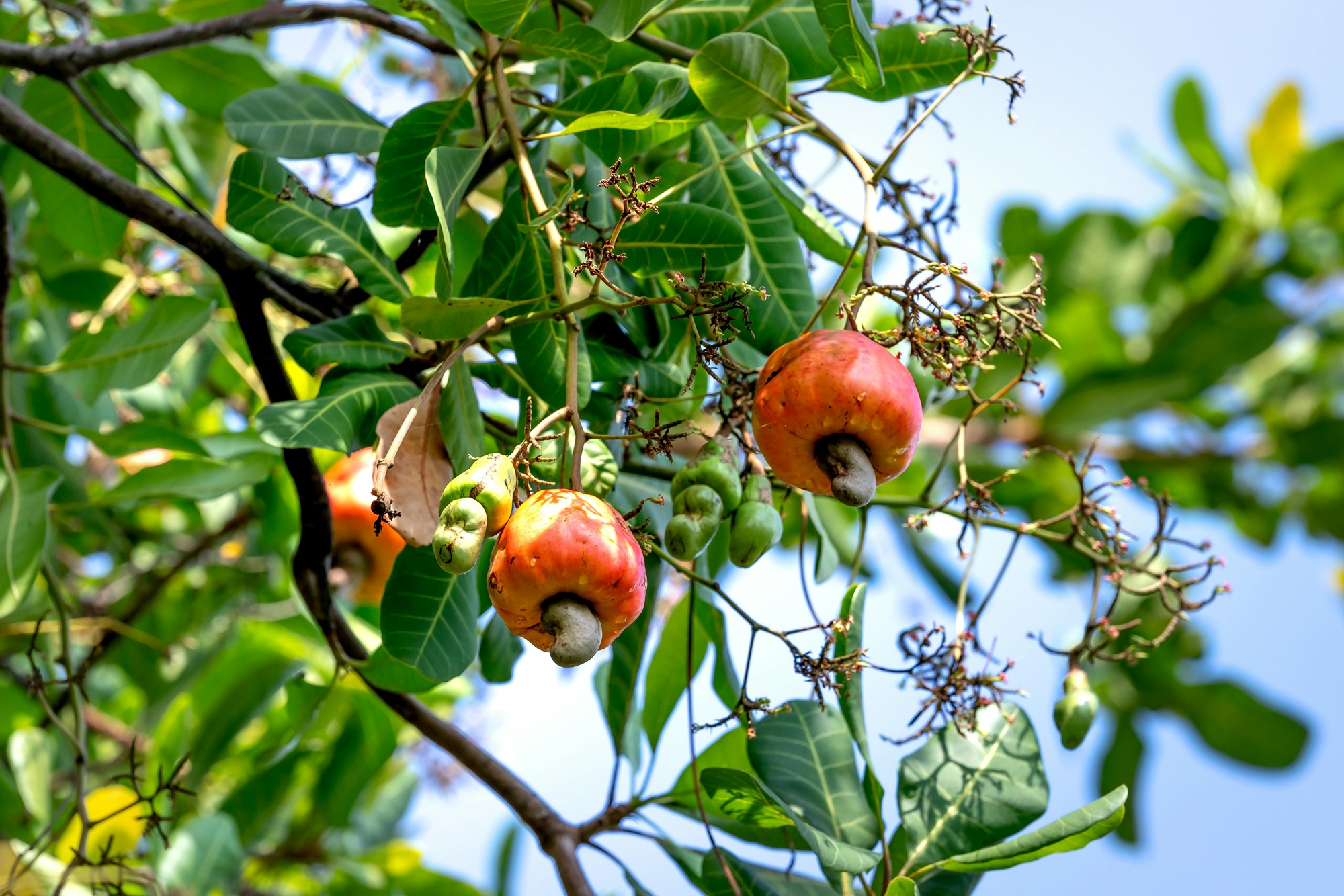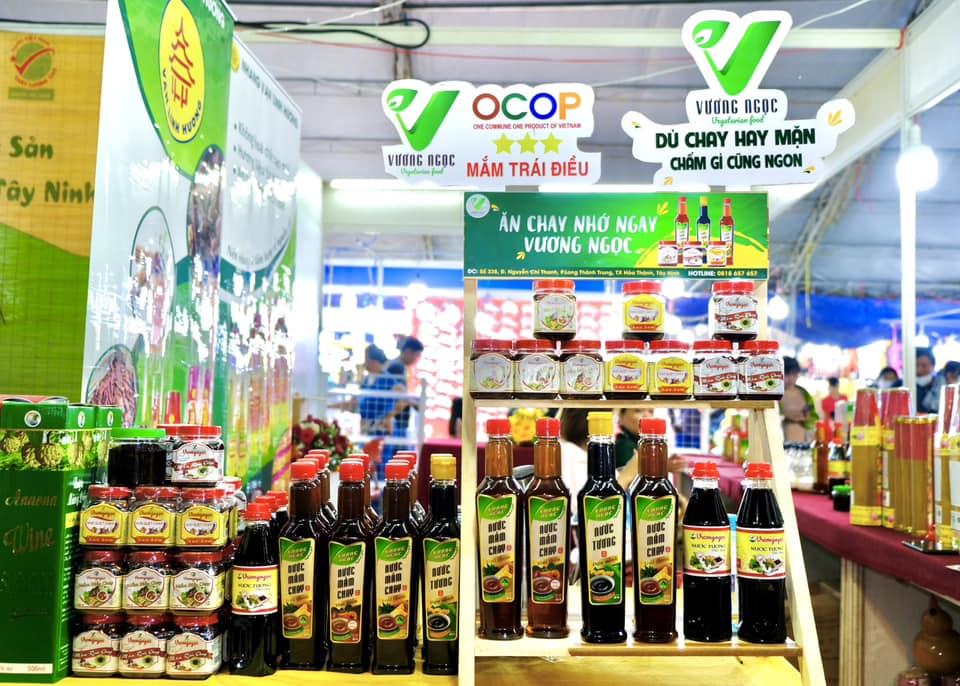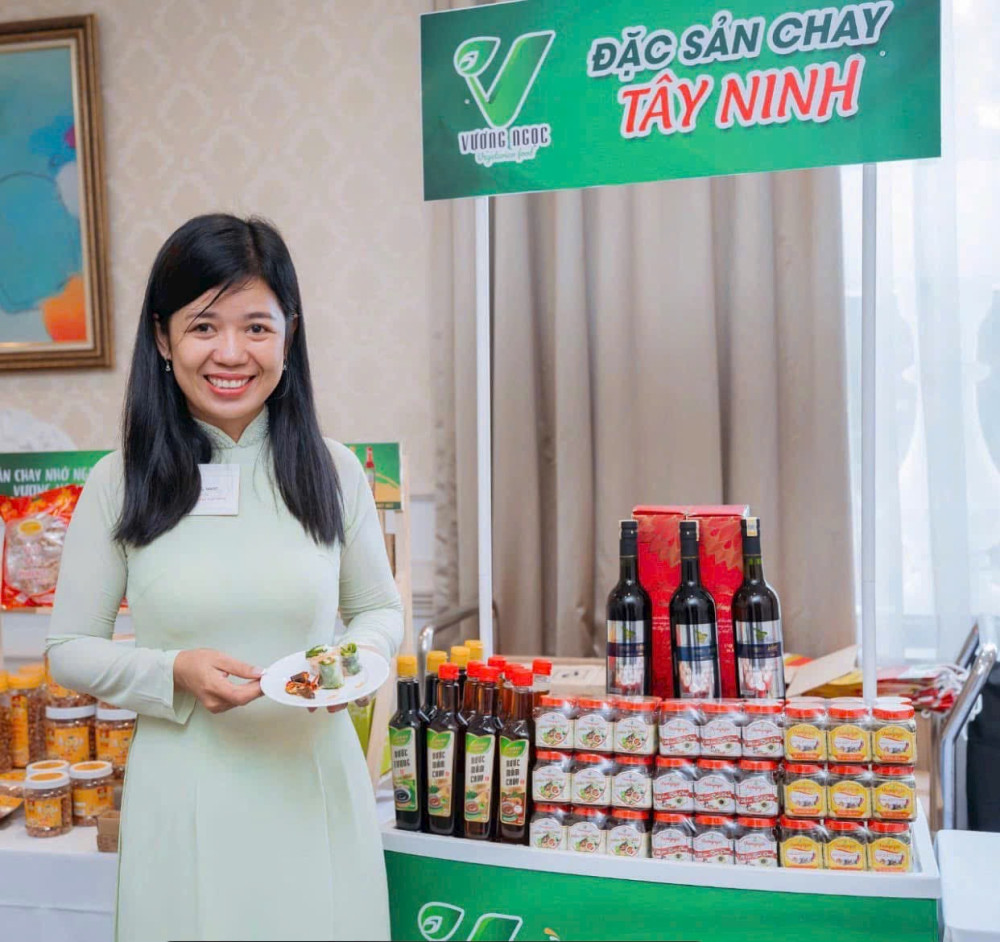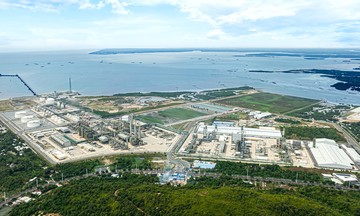Au Vuong Ngoc (born in 1982) established the Vuong Ngoc vegetarian food production company in 1992, with cashew fruit fish sauce as its flagship product. This product earned the company first prize in the Tay Ninh Province Innovation and Startup Competition in 2024-2025 and was recognized as a 3-star OCOP (One Commune One Product) product. More importantly, the product addresses the issue of cashew fruit waste, previously considered an agricultural byproduct.
From waste to "golden ingredient"
In 2024, Vietnam exported 724,000 tons of cashew nuts, generating 4.37 billion USD. Tay Ninh is a province with a large cashew growing area. According to experienced cashew farmers, 1 hectare yields about 2 tons of nuts and about 6 tons of fruit. However, the fruit is often discarded after the nuts are harvested due to its perishability. Within 24 hours, the fruit begins to ferment, rot, and spoil.
 |
The cashew tree, often only the nut is used. Photo: Pexels |
The cashew tree, often only the nut is used. Photo: Pexels
Born in Tay Ninh, into a vegetarian family, Ngoc wondered how to utilize local produce to create value and provide farmers with additional income from resources they hadn't previously considered. Drawing on her experience in vegetarian food production, in 2019, she experimented with fermenting fresh cashew fruit after harvest, extracting the juice, and processing it into fish sauce.
With the first batch complete, Ngoc nervously poured each drop of the sauce for her family to try. "It's as good as fish sauce—hearing everyone say that, I knew this was a new opportunity for a resource often treated as waste," Ngoc said.
Cashew fruit has a naturally high sugar content, is rich in amino acids, and has a delicate flavor and aroma, making it suitable for fermentation into a natural, savory, and easy-to-use fish sauce without the need for additives. Additionally, Vietnam has approximately 300,000 hectares of cashew trees, providing an abundant local source of raw materials.
"But starting something new is never easy," Ngoc said. She spent three years researching. The biggest challenge was controlling the variations in raw materials across seasons. "It sounds simple, but anyone who has worked with fresh produce understands that each season is a mystery. Cashew fruit varies from year to year."
During intense sunshine, the fruit develops a strong sweetness. In rainy seasons, it has a slightly sour taste and more diluted juice. Some seasons yield smaller fruit with less juice. The sugar, protein, pH, and acidity levels fluctuate. Initially lacking quality control tools and guidelines, Ngoc relied on her taste buds and personal senses, making it difficult to create a consistently flavored product. The company embraced a learn-as-you-go approach, accepting mistakes and finding ways to improve.
"I once cried because I had to discard over 30,000 liters of cashew juice, thinking I had failed," she said.
Despite moments of discouragement, Ngoc persevered. Based on initial experiments, the company invested 4 billion VND in equipment, including pressing machines, fermentation tanks, and a semi-automatic filtration and bottling system. Instead of relying on personal experience, she shifted to data-driven measurements to determine the optimal formula. The ISO 22000 standard for food safety management was also implemented in 2021.
As a result, the team found the optimal formula for cashew fruit fish sauce. Fresh fruit is selected, washed, and destemmed, then pressed to extract the juice. The juice is naturally fermented with mineral salt (ratio of approximately 3:1) for 4–6 months at a stable temperature between 30 and 37 degrees Celsius. Afterward, the product undergoes filtration, settling, cooking, and bottling. "We continuously monitor pH, protein, alcohol, salinity, and microbial levels to ensure safety," explained Ngoc.
 |
Cashew fruit fish sauce displayed at OCOP product promotion events in Tay Ninh Province. Photo: NVCC |
Cashew fruit fish sauce displayed at OCOP product promotion events in Tay Ninh Province. Photo: NVCC
Current production capacity exceeds 10,000 liters per day, equivalent to 20,000 500ml bottles. The fish sauce has a natural reddish-brown color, a mildly savory flavor, and a delicate taste suitable for vegetarians and those on restricted diets. The product is available in many supermarkets and OCOP points of sale in Long An. Late last year, the company exported its first shipment to the US and Canada and is working towards obtaining Halal certification.
50% increase in income for farmers
Producing 100 liters of pure fish sauce requires 300 kg of fresh cashew fruit. With a daily capacity of 10,000 liters, the company requires 30 tons of fruit. The company has signed purchase agreements with orchards inside and outside Tay Ninh Province at a price of 3,000 VND per kg. Farmers not only supply raw materials but can also directly participate in the production process.
In addition to purchasing raw materials, the company selects farmers and households to transfer the fermentation process, bringing pressing and fermentation machines directly to the orchards. Farmers carry out the process themselves and then sell the raw fish sauce at 50,000 VND per liter. Consequently, farmers earn an additional 15–20 million VND per hectare each season. Estimating the profit from cashew nuts at around 40 million VND/ha, participating in the fish sauce production process adds 50% to their monthly income.
After purchasing from farmers, each batch is sent for testing at certified centers to ensure it meets export requirements. The company also has an internal R&D team and 15 employees working at the factory to collect product data and make adjustments before market release.
According to Ngoc, the current production process contributes to green, circular agriculture and reduces emissions. Instead of drying and burning cashew fruit, generating CO2, it is utilized to create a popular vegetarian food product. In addition to fish sauce, the company also produces cashew-based chili sauce, dried cashew fruit, wine, and vinegar.
"I believe that the circular economy is not a trend but a necessity for Vietnam's sustainable development. Each business needs to shift its mindset; don't see spoiled agricultural products, see forgotten potential," she said.
 |
Vuong Ngoc with vegan products made from cashew fruit. Photo: NVCC |
Vuong Ngoc with vegan products made from cashew fruit. Photo: NVCC
Tay Ninh Province (after merging with Long An) currently has around 400 OCOP products ranked 3 stars or higher. The province aims to promote both the breadth and depth of OCOP products like cashew fruit fish sauce. Businesses like Ngoc's receive provincial support for market expansion through trade promotion, digital technology application, and establishing points of sale.
According to Ngoc, for innovative OCOP businesses to thrive long-term, further preferential policies for technology transfer and stable output connections are needed. Achieving this requires collaboration between the government, businesses, cooperatives, and the people.
Vuong Ngoc's fish sauce production facility is also seeking investment to expand the factory and increase capacity to 50,000 liters per day. The company aims to collaborate with various partners to introduce the product through tourism, experiential activities, and education, while strengthening online business. The goal for 2026 is to have the product available in at least 15 countries, including the EU.
Hoai Phuong
VnExpress e-newspaper seeks to explore and introduce innovative models and technology applications in all fields. Share your business's innovative model here. Suitable models and stories will be selected for publication.












